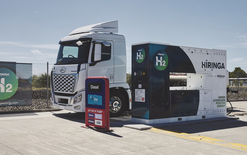Daimler to wind down fuel-cell research
The head of Daimler AG, Dieter Zetsche, said at an automotive conference in Stuttgart, Germany that hydrogen fuel cells are no longer a major part of future research and development plans for the company. According to engineering news site Smart2Zero, Zetsche told the summit that declining battery costs have made fuel cells uncompetitive in the growing EV market. “Battery costs are declining rapidly, whereas hydrogen production remains very costly,” Zetsche said. Last week, Zetsche announced at the annual shareholder's meeting a $15 billion cash injection into its EV development fund and detailed plans to roll out 10 new EV models by 2022, including a Mercedes-Benz S-Class plug-in hybrid. Zetche’s twin announcements suggest the 2013 agreement between Ford, Daimler and Renault-Nissan to jointly develop fuel-cell technology could be winding down. The process of manufacturing liquid hydrogen to power fuel-cell vehicles is extremely energy-intensive, and the recent development of long-range electric batteries have rendered the chief advantage of hydrogen fuel-cells over other alternative energy sources moot. Fuel-cell vehicle sales lag far behind EVs. The most popular fuel-cell vehicle, the Toyota Mirai, has sold just 2,840 units as of February 2017, with sales projected to top 30,000 by 2020. Conversely, the Nissan Leaf, the highest-selling EV worldwide, sold 250,000 units by the end of 2016.





